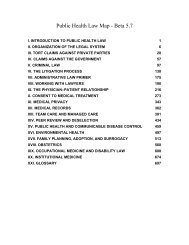Healing a Broken World - Society of Jesus
Healing a Broken World - Society of Jesus
Healing a Broken World - Society of Jesus
Create successful ePaper yourself
Turn your PDF publications into a flip-book with our unique Google optimized e-Paper software.
<strong>Healing</strong> a <strong>Broken</strong> <strong>World</strong><br />
welfare <strong>of</strong> the people or the environment. Whole communities are frequently<br />
displaced in order to make way for mining industries, permanently<br />
damaging the cultural and spiritual links <strong>of</strong> the people to the land <strong>of</strong> their<br />
ancestors and with inadequate compensation for destruction <strong>of</strong> their<br />
livelihoods. Further, benefits from mining do not reach the communities<br />
from where the minerals are extracted. Some companies wilfully ignore<br />
national environmental protection policies, while others bribe corrupt<br />
government <strong>of</strong>ficials in order to evade sanctions. Nigeria is being devastated<br />
by the ecological consequences <strong>of</strong> incessant oil spills, reckless extraction, and<br />
perhaps the worst gas flaring rates in the world, while the Niger Delta is<br />
now a major security threat not only to the West African region but also to<br />
global peace. Changes in climate affect food production and dramatically<br />
limit Africa‘s economic capacity to reduce poverty. In Zambia the intensity<br />
and frequency <strong>of</strong> droughts and floods have been increasing. Much <strong>of</strong> the<br />
continent, especially in land-locked countries such as Chad, faces significant<br />
challenges arising from desertification, heightening concerns about water<br />
security.<br />
Latin America<br />
18] In Latin America the destruction <strong>of</strong> productive potential occurs through<br />
the social, cultural and environmental impact <strong>of</strong> macro mining and energy<br />
projects, the privatization <strong>of</strong> water, the introduction <strong>of</strong> inappropriate<br />
technological models, and the devastating rhythm <strong>of</strong> resources extraction.<br />
The diffusion <strong>of</strong> social models <strong>of</strong> consumption leads to ecosystems being<br />
degraded through soil erosion and the exhaustion <strong>of</strong> natural resources.<br />
Agricultural expansion in the humid Latin American tropics is carried out<br />
largely by those people who have been displaced from traditional areas by<br />
poverty, violence, and land scarcity. The appropriation <strong>of</strong> the best lands and<br />
large labour areas for commercial agriculture and cattle-raising has pushed<br />
subsistence agriculture into the hillsides and the mountains. There are<br />
regional imbalances in development affecting, especially, indigenous<br />
peoples, as well as irrational uses <strong>of</strong> water, energy, tropical rainforest,<br />
minerals, and human resources, all caused by urban and industrial<br />
concentration and political and economic centralization. The devastation <strong>of</strong><br />
natural resources and their effects on global environmental problems are<br />
largely a consequence <strong>of</strong> poor models <strong>of</strong> industrialization. The design and<br />
application <strong>of</strong> alternative models is not as complicated as may initially<br />
Page 21 ■
















